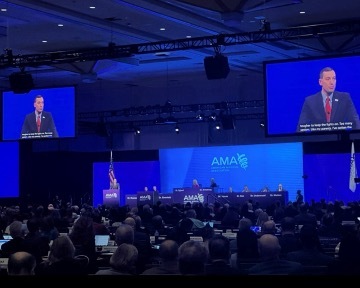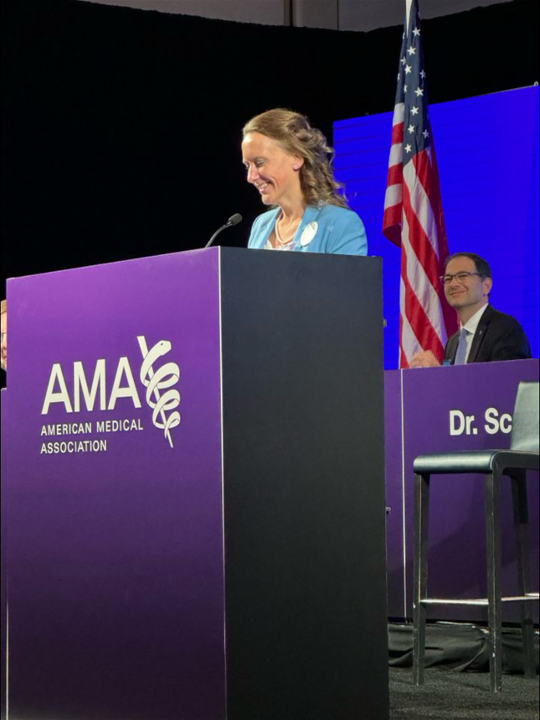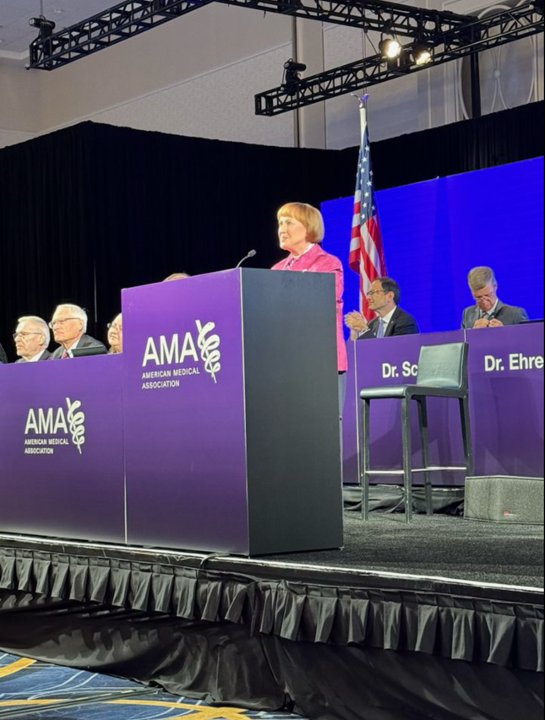- Home
- Advocacy
- Latest News and Practice Data
- November 14, 2023
November 14, 2023
In this Issue:
- CAP Leaders Meet with FDA to Seek Clarification on Proposed LDT Rulemaking
- AMA Meeting: CAP Strengthens Network Adequacy, Fights to Prevent Future Medicare Cuts
- Senate Committee Moves Bill Forward to Lessen Cut to the 2024 Medicare Physician Fee Schedule
- CAP and over 50 Physician Groups Urge Lawmakers to Mitigate Cuts in 2024 Medicare Physician Fee Schedule
- The CAP and Scientific Societies Urge Congress to Increase Funding for AMD Program
- CAP Advocates for Streamlining Regulatory Requirements and Accreditation at CLIAC Meeting
- Webinar: What Will Be the Impact of the Final Fee Schedule on Your Practice?
- Take Our News Quiz for November
CAP Leaders Meet with FDA to Seek Clarification on Proposed LDT Rulemaking
On November 13, CAP leaders met with officials from the Food and Drug Administration (FDA) to ask clarifying questions about the FDA’s proposed regulation of laboratory-developed tests (LDTs) and how these rules would affect laboratories and patients. The CAP is in the process of drafting its comments and sought clarification on the proposal to inform its comments, due to the FDA by a December 4 submission deadline.
The meeting with the FDA was led by CAP President Donald S. Karcher, MD, FCAP; Immediate-Past President Emily E. Volk, MD, FCAP; Chair of the Council on Scientific Affairs Bradley S. Karon, MD, PhD, FCAP; Chair of the Council on Government and Professional Affairs (CGPA) A. Joe Saad, MD, FCAP; and former CGPA Chair Jonathan L. Myles, MD, FCAP.
“The CAP is actively reviewing the FDA proposed rulemaking on LDTs and drafting comments that align with our principles for regulatory oversight,” Dr. Karcher said. “Ultimately, we are seeking a balanced approach to oversight that enhances patient safety, allows innovation to continue, and maintains quality laboratory testing without creating significant regulatory burdens on pathologists and their laboratories.”
The FDA released the proposed rulemaking for LDTs on September 29. The CAP has serious concerns regarding several provisions in the proposed regulation and the CAP will call on the FDA to make significant changes to the proposal. During the November 13 meeting, the CAP asked questions about exemptions for manual tests, the FDA’s risk classification system and how tests can be down-classified by risk tier, the FDA’s existing regulatory framework for in vitro diagnostics, and labeling requirements.
Immediately after the proposed rulemaking’s release, the CAP was first to request that the FDA give stakeholders 120 days to review the proposal due to its complexity and implications for laboratory testing. On October 30, the FDA said it would proceed with the standard 60-day comment period.
During the meeting, the CAP asked the FDA if it would reconsider the decision given the amount of uncertainty over the proposed rule in the laboratory community. The FDA confirmed that the deadline to submit comments would not change. After review of the comments, the FDA will move forward with work on finalizing the regulation.
AMA Meeting: CAP Strengthens Network Adequacy, Fights to Prevent Future Medicare Cuts
At the interim meeting of the American Medical Association (AMA) House of Delegates, the CAP worked on policy to prevent future Medicare cuts to physician payment, strengthening network adequacy, protect the AMA/Specialty Society Relative Value Scale Update Committee (RUC), supporting residents and physicians when it comes to advocating for the creation and implementation of institutional policies, and address Medicaid unwinding.
The CAP led a delegation of the Pathology Section Council, which includes the American Society for Clinical Pathology, American Society of Cytopathology the National Association of Medical Examiners, and the American Society of Dermatopathology. Nearly 700 physicians, residents, and medical students gathered in to consider proposals across a wide range of clinical practice, payment, medical education, and public health topics.

Strengthening Network Adequacy
The Pathology Section Council and CAP delegates supported an AMA report on network adequacy regarding the establishment and enforcement of a minimum network adequacy standard requiring all health plans to contract with sufficient numbers and types of physicians and other providers. The report would also direct the AMA to support requiring health plans to report on the number of physicians versus non-physicians in the network overall and by specialty/practice focus.
The CAP advocates for states to require health plans to have adequate networks of hospital-based physicians, including pathologists. We recommend states evaluate their approved and licensed insurance plans’ networks for in-network pathologist participation adequacy as well as the timeliness, proficiency, scope of pathology services provided, including genetic analysis, and utilization of pathology services. We believe that any state-approved health insurance plan network, including qualified health plans under State Health and Federal Insurance Exchanges/Marketplaces, be subject to plan adequacy requirements, enforced by each state.

Addressing Medicaid Unwinding
The Pathology Section Council and CAP delegates supported an AMA report addressing the loss of coverage and uninsurance rates following the return to regular Medicaid redeterminations and the end of the COVID-19 Public Health Emergency (PHE). The Medicaid unwinding has been described as the most significant nationwide coverage transition since the Affordable Care Act, with major implications for patients, physicians, and health equity. The AMA report added AMA policy that encourages state implementation of strategies to reduce inappropriate terminations from Medicaid/CHIP for procedural reasons; encourages states to provide continuity of care protections to patients transitioning from Medicaid or CHIP to a new health plan; and encourages state Medicaid agencies to make coverage status, including expiration of current coverage and information on pending renewals, accessible to physicians, clinics, and hospitals.
Protecting the RUC
The CAP worked with the Pathology Section Council and the AMA House of Delegates to defeat a resolution that would have disrupted the RUC process and harmed pathology’s efforts working with that entity.

Supporting Resident and Fellow Physicians
Resident and fellow physicians deserve a seat at the table when it comes to advocating for the creation and implementation of institutional policies that ensure their professional development, well-being and rights, according to policy adopted at the Interim Meeting.
Originally adopted as AMA policy more than a decade ago, the Resident and Fellows’ Bill of Rights offers a key framework for protecting resident well-being.
To ensure residents and fellows are part of the process of ensuring policies related to well-being are in their best interest—and that they have more freedom of movement if their employment at a residency or fellowship program becomes untenable—the House of Delegates adopted new policy to encourage the formation of peer-led resident and fellow organizations that can advocate for trainees’ interests.
Senate Committee Moves Bill Forward to Lessen Cut to the 2024 Medicare Physician Fee Schedule
On November 8, the Senate Finance Committee voted to approve of a legislative package with provisions on physician pay, mental health, and drug pricing out of committee. In the package, senators supported mitigating cuts to the 2024 physician fee schedule conversion factor, partially extend Medicare’s Alternative Payment Model (APM) bonus beyond 2023 and provide a one-year delay in Clinical Laboratory Fee Schedule cuts and reporting requirements. The CAP has advocated for these specific provisions and supported the committee’s actions to protect the value of pathology and other physician services.
Among the provisions included in the Better Mental Health Care, Lower-Cost Drugs, and Extenders Act were:
- Legislative language to replace the current increase of 1.25% for the 2024 Medicare fee schedule with a 2.5% increase in 2024.
- A provision for a 1.75% APM Incentive Payment for qualifying participants for payment year 2026 (based on performance year 2024). This payment is half of the 3.5% incentive payment that these models are getting this year.
- A provision to limit payment reductions of up to 15% in the Medicare Clinical Laboratory Fee Schedule until January 1, 2025, by delaying the reporting and collecting of private insurance payments for clinical laboratory services through December 31, 2024, and by extending the zero-percent cap on payment reductions through 2024.
Finance Committee Chair Ron Wyden (D-OR) said: “Next year, the Finance Committee will take a deeper look at Medicare physician payment, as several provisions in current law have to be re-examined.” Sen. John Thune (R-SD), who also sits on the committee said: “Instead of Congress making payment adjustments every year, it's time we address the underlying issues and make long-term reforms of this physician fee schedule to ensure there is stability for physicians and the Medicare program for the future.”
CAP and over 50 Physician Groups Urge Lawmakers to Mitigate Cuts in 2024 Medicare Physician Fee Schedule
The CAP and more than 50 physician and health care groups urged House and Senate leadership to mitigate the 3.4% conversion factor cut published in the final 2024 Medicare Physician Fee Schedule.
In a November 3 letter to lawmakers, the groups said the inclusion of the G2211 code is creating across-the-board cuts to all physicians and other providers under the fee schedule. The CMS said code G2211 reflects the time, intensity, and practice expense required to build longitudinal relationships with patients and address most of their health care needs with consistency and continuity over long periods of time. However, the CAP has contended that the implementation of G2211 essentially allows duplicative billing as the work of G2211 is already described and accounted for within the existing CPT code set for evaluation and management services. In October, the CAP and 46 health care organizations sent a letter to Congress asking them to halt the implementation of the G2211 code.
The CAP successfully lobbied Congress to delay payment for G2211 in 2021 when the CMS initially attempted to established payment for the code. The CAP will continue its advocacy efforts to protect the value of pathology services.
The CAP and Scientific Societies Urge Congress to Increase Funding for AMD Program
The CAP and close to 40 scientific societies, professional associations, academic institutions, and companies are urging Congress to increase funding to $175 million for the Advanced Molecular Detection (AMD) program at the Centers for Disease Control and Prevention (CDC), given its increasing importance to our nation’s public health response to infectious disease threats. In a November 3 letter, the groups asked the House and Senate to negotiate the fiscal year 2024 Labor, Health and Human Services (HHS), Education and Related Agencies
spending bill to provide the highest funding level possible.
AMD integrates the latest genomic sequencing technologies with bioinformatics and epidemiology expertise across CDC and the nation to help find, track, and stop disease-causing pathogens. AMD is also helping to ensure that the nation’s public health microbiologists, epidemiologists and other health care professionals have the tools needed to apply biotechnology-driven innovations to complex problems. This enables higher quality data and analytics that CDC and public health partners can use to detect outbreaks sooner, respond more effectively, and ensure that these tools are available in laboratories across the United States.
CAP Advocates for Streamlining Regulatory Requirements and Accreditation at CLIAC Meeting
On November 8-9, the Centers for Disease Control and Prevention (CDC) hosted meetings for the Clinical Laboratory Improvement Advisory Committee (CLIAC) and invited the CAP to provide input. CAP members Diana Cardona, MD, MBA, FCAP, and Michael Datto, MD, PhD, FCAP, testified and presented on behalf of the organization.
Dr. Cardona testified with the CAP response to the final report from the CLIAC Regulatory Assessment Workgroup, highlighting positions on efforts to modernize CLIA oversight of histology, Proficiency Testing (PT) in the total testing process, and regulations to support remote sign out. Dr. Datto’s presentation on the Top 10 Accreditation Deficiencies explored the accreditation challenges laboratories face, the root causes for citations, and recommended changes including streamlining regulatory and workforce requirements, as well as encouraging the use of technology to reduce burden on laboratory staff.
The committee discussed areas such as electronic testing reporting within CLIA regulations that potentially need to be modified to address recent regulatory changes (eg, compliance with the ONCE Information Blocking Regulations). CLIAC also discussed and passed several recommendations, but the agency has yet to make final determinations on whether it will take action.
Webinar: What Will Be the Impact of the Final Fee Schedule on Your Practice?
The CMS just released the final 2024 Medicare payment regulations, including rules for the Medicare Physician Fee Schedule and the Quality Payment Program.
On Thursday, November 30 at 3 PM ET/ 2 PM CT, the CAP will offer a complementary live webinar where CAP experts will review final regulations that will impact Medicare payment for services and pathologists’ participation in the quality initiatives. Webinar presenters will be the Council on Government and Professional Affairs Chair A. Joe Saad, MD, CPE, FCAP; Economic Affairs Committee Chair Ronald McLawhon, MD, PhD, FCAP; and Quality and Clinical Data Registry Affairs Committee Chair Gregary Bosci, DO, FCAP.
Take Our News Quiz for November
Are you up to speed on CAP advocacy news? Take our new monthly news quiz and see how many you can get right and share your results on social media.